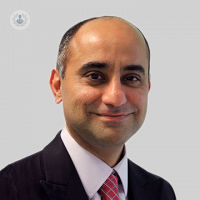Why do I have breast pain?
Written in association with:Breast pain (also clinically referred to as mastalgia, myalgia, and mastodynia) can make many women quickly assume that they have breast cancer. However, as Mr Devalia explains in this article, hormones are the most likely source of breast pain. Read on to learn about breast pain causes and treatment.

What exactly is breast pain?
Breast pain is any persistent pain which originates from the breast. When considering if you have breast pain, you must be very careful to identify where it’s coming from. What may feel like breast pain can actually originate from the chest wall or heart.
Breast cancer: a common worry
When experiencing breast pain, many women may quickly consider that it could be due to breast cancer, but other reasons are actually more common. In fact, evidence suggests that less than 3% of breast pain cases are related to breast cancer.
Hormones: the most common cause
It’s important to recognise that in the majority of women with breast pain, the cause is an imbalance of hormones and not breast cancer. This imbalance can be influenced by numerous factors such as your diet, menstruation and medication. Factors such as these cause levels of oestrogen and progesterone to fluctuate, which results in your brain sending incorrect signals that ultimately cause breast pain.
Hormonal breast pain can be split into two categories:
- Cyclical breast pain is related to your menstrual cycle and the pain will appear and disappear with your fluctuating hormones at specific stages of the cycle. Usually, this pain occurs just before your period or during it.
- Non-cyclical breast pain is not related to your menstrual cycle at all. Instead, other internal or external factors are a cause, such as diet, stress and medication.
Affect of diet on hormones
Your diet can create an imbalance of hormones. Unbeknownst to many, dairy, caffeine and soya can increase your level of oestrogen. I’ve attended a patient who was drinking soya milk every day thinking that it was completely healthy when, in fact, it contains ‘false’ oestrogen. The ‘false’ oestrogen from food is often plant-based and is very similar to oestrogen created by humans regarding how the body processes it. When the patient stopped consuming soya milk, the breast pain disappeared.
Affect of medication on hormones
Even medications can cause breast pain, such as newer drugs and antacid tablets like Lansoprazole and Omeprazole. Not only can these cause breast pain in women, but in men also. Oral contraceptive pills and hormone replacement therapy can also be a source of breast pain.
Previous breast-related treatments
Having had surgery or radiotherapy can also cause breast pain.
How is the cause of breast pain diagnosed?
Any persistent breast pain should be investigated with a triple assessment in a one-stop breast clinic. This triple assessment includes:
- a complete breast examination – you’ll be asked about your medical history and receive a physical check
- imaging test(s) – a mammogram with or without an ultrasound
- If required, a biopsy may be taken
How is breast pain treated?
There are different types of treatment available for breast pain. However, I have found a few which have been really effective. They are:
Wearing sports bras
These offer adequate and firm bra support and are particularly helpful after surgery. Many of my aesthetic and reconstructive surgery patients will always wear a sports bra after having surgery. The benefit is that it diminishes the need for any strong pain killer after surgery. It can also help those who haven’t had surgery.
Using over the counter gel
A lot of women will try to take oral paracetamol and ibuprofen but I suggest avoiding that. Diclofenac (Voltarol gel) is available over the counter and will be much more useful than oral pain killers. This gel can be applied up to three times a day and unlike painkillers, there isn’t the risk that it will create gastrointestinal problems.
When to see a medical specialist
One has to understand that if there is a cause of breast pain, it needs to be eliminated. If the pain persists after you try dietary changes such as consuming a low-fat diet and reducing caffeine, make sure you see a specialist.
Worried about your breast health? Book an appointment with Mr Devalia via his profile. He is highly skilled in diagnosing breast pain and has been awarded for his exemplary work in breast surgery.


